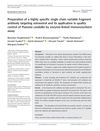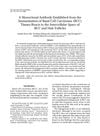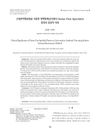 1 citations,
December 2022 in “Archives of Dermatological Research”
1 citations,
December 2022 in “Archives of Dermatological Research” Acne treatment with isotretinoin increases the presence of p53, a protein, in skin and oil glands, which may help reduce acne severity.
 1 citations,
September 2022 in “Journal of dermatological science”
1 citations,
September 2022 in “Journal of dermatological science” Certain vitamins and their derivatives can help hair grow longer by activating specific growth signals.
 December 2024 in “Cell Communication and Signaling”
December 2024 in “Cell Communication and Signaling” Fat tissue vesicles protect skin from UV damage better than stem cell vesicles.
 November 2024 in “Journal of Cosmetic Dermatology”
November 2024 in “Journal of Cosmetic Dermatology” The plant extracts may help treat hair loss by promoting hair growth and reducing DHT levels.
The KRT84 gene is linked to better wool quality in Gansu Alpine Fine-wool sheep.
 January 2024 in “Biotechnology advances”
January 2024 in “Biotechnology advances” Bioassays help find useful compounds in nature for making medicines, supplements, and cosmetics.
 November 2023 in “Advanced functional materials”
November 2023 in “Advanced functional materials” Magnesium Silicate Sprays help heal burn wounds and regrow skin features better than commercial products.
CCC1 is crucial for pH balance in plant cells, affecting growth and stress tolerance.
Different types of sun exposure damage skin cells and immune cells, with chronic exposure leading to more severe and lasting damage.
117 citations,
September 2003 in “Molecular & cellular proteomics” The technology can help diagnose and subtype autoimmune diseases by identifying specific autoantibodies.
 23 citations,
December 2012 in “ChemistryOpen”
23 citations,
December 2012 in “ChemistryOpen” Probe detects finasteride with high selectivity and low detection limit.
 15 citations,
July 2023 in “EClinicalMedicine”
15 citations,
July 2023 in “EClinicalMedicine” ADCs can effectively treat breast cancer but may cause side effects like nausea and hair loss.
Anti-keratin antibody from cow milk makes damaged hair stronger and less likely to break.
 August 2024 in “Frontiers in Pharmacology”
August 2024 in “Frontiers in Pharmacology” Antibody treatments show promise for hair loss but need more research.
54 citations,
February 2012 in “Pediatrics in Review” Pediatric systemic lupus erythematosus is a severe autoimmune disease in children requiring early diagnosis and comprehensive management.
 26 citations,
February 2016 in “Respiratory Medicine”
26 citations,
February 2016 in “Respiratory Medicine” Auto-antibody testing is a useful but not definitive tool in diagnosing interstitial lung diseases, and using a specific algorithm could make testing more cost-effective.
 5 citations,
April 2019 in “Phytochemical Analysis”
5 citations,
April 2019 in “Phytochemical Analysis” The new ELISA method is reliable and eco-friendly for checking the quality of Pueraria candollei.
4 citations,
January 2018 in “Health” Ostrich antibodies are a promising, cost-effective treatment for various skin diseases and conditions.
 3 citations,
May 2018 in “Reproductive Sciences”
3 citations,
May 2018 in “Reproductive Sciences” The drug BAY 1158061 is safe, well-tolerated, and shows potential for treating diseases related to prolactin.
 1 citations,
November 2002 in “Journal of dermatology”
1 citations,
November 2002 in “Journal of dermatology” The antibody created from BCC tissues reacts similarly to both BCC and hair follicles, suggesting BCC may come from hair follicle cells.
 April 2023 in “Dermatology practical & conceptual”
April 2023 in “Dermatology practical & conceptual” Some patients with hair loss after mild COVID-19 had positive tests for certain autoantibodies.
 278 citations,
March 2013 in “Gut”
278 citations,
March 2013 in “Gut” Anti-IL-12/IL-23 antibody therapy effectively treats psoriasiform skin lesions in IBD patients.
 28 citations,
April 2009 in “Annals of laboratory medicine”
28 citations,
April 2009 in “Annals of laboratory medicine” The dense fine speckled pattern in ANA tests is common in autoimmune diseases, challenging previous beliefs that it was unrelated.
 17 citations,
May 2015 in “Nanomedicine: Nanotechnology, Biology and Medicine”
17 citations,
May 2015 in “Nanomedicine: Nanotechnology, Biology and Medicine” Scientists created tiny particles loaded with a hair growth drug, minoxidil, that specifically target hair follicles and skin cells to potentially improve hair growth.
 5 citations,
June 2022 in “Frontiers in immunology”
5 citations,
June 2022 in “Frontiers in immunology” Increasing Treg cells in the skin does not cure hair loss from alopecia areata in mice.
4 citations,
October 2016 in “The journal of investigative dermatology/Journal of investigative dermatology” Using an anti-ICAM-1 antibody with rapamycin improves hair transplant survival in monkeys.
 3 citations,
February 2022 in “Journal of Infection”
3 citations,
February 2022 in “Journal of Infection” People with no symptoms or mild COVID-19 have lower antibody levels, increasing their risk of getting COVID-19 again.
 3 citations,
February 2022 in “Rheumatology”
3 citations,
February 2022 in “Rheumatology” Baricitinib was effective in treating a patient with dermatomyositis and hair loss.
1 citations,
January 2015 in “Acta Dermato Venereologica” Autoimmune myopathy may be linked to hair loss and skin depigmentation.
 January 2025 in “Frontiers in Immunology”
January 2025 in “Frontiers in Immunology” IVIG therapy significantly improved symptoms in a patient with APS-2 and SPS.




















